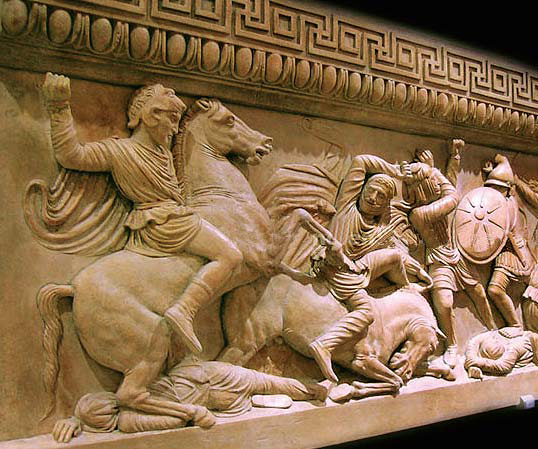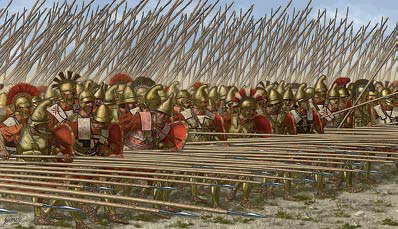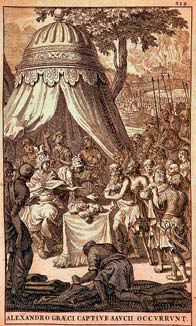From Troy, Alexander walked inland to Asia to the river of Granikos. There, the Persians were waiting for him having extented East of Granikos, 20.000 horse-riders and 20.000 Greek soldiers. Alexander lined up with one part of his army consisting of 13.000 soldiers and 5.000 horse-riders with special skillls. The battle began and Alexander proved his military intelligence. First in battle without fear. Even though his spear broke, to his guards, he still fought so his soldiers would see him and obtain courage, whilst the enemy to be discouraged. Threatened by death, Kleitos saved him. Alexander with speed and organisation beat the first well-known Persian cavalry and the army. The Greek soldiers were surrounded and only 2.000 survived, which were sent with chains to Greece to work all their lives because ” even though Greeks they fought against Greeks “.
The 25 dead Macedonian cavalry were considered heroes. The victims of the rest of the cavalry and army were buried with honour, while their parents and children were relieved from taxation for the rest of their lives. It was a small example of many and important acts that showed his superiority and mainly the different power of Alexander. It was an act that became a habit from the Macedonian king.

Protraction of Alexander the Great’s battle
Alexander, after visiting the wounded, sent 300 Persian armour to be dedicated to goddess Athina at Parthenon.
The sign that accompied the medals closed with a few greek words and the adventure with the Persians: ” Alexander, Philip, and the Greeks minus the Lakedemonion from the babaric Asian inhabitance ” (apart from the Lakedemonious, because they were the only Greeks that did not take part in the campaign). After their defeat the Persians fled, but Alexander notified that the land was his and that the residence were his subjects now. When he declared Troy as a free city, he continued his journey towards Sardis, the centre of Lydia, the city where his residence would govern with their own laws and would be free. Freedom a basic ingredience in human existance, as it was built at the prosperity of Greek civilization, consist of a central point of Alexander politics. Even though the residence were defeated and had even allied with the Persians, Alexander regarded that he could govern them by pressure and slavery as a basic weapon. Parallel to the standard of freedom, he showed another position of life to the nation that he governed, even though it may sound strange and aggressive.
In continuation Alexander with his army moved on towards Epheso, giving freedom to one Greek city. Ephesos was a significant city, due to its position, and its freedom consisted of a symbolic act for Alexander’s power,which had a special place in the kingdom of Asia, giving an end to war, ” structure “.
The next station was Militos. Another important city of that area, where the Greek fleet met the Persian, a total strength of 400 trireme. Militos was conquered at the burden of the siege. So the strongest Greek city in the west of Asia Minor was in Alexander’s hands.

Macedonian phalank
The continuation of the campaign concerned Alikarnassos, after her seige. Alexander sent the newly wed soldiers home in winter 334-333 so they could be with their wives. This act made him more popoular, because their king could understand them, feel them, and give them the joy to be with their families that they were deprived of with the campaigns. Meanwhile the officers had orders to recruit new soldiers, the fact that consisted of intensive necessity, due to the fact that the army was going towards Asia and the strength of Macedonian king had to be of quantity and quality depending on the aim they had received.
In continuation Alexander went towards Pamphilia and camped in the greek city of Pergi, where it made its base. They continued their route towards Sidi and when he learnt that the next city, Aspendos, refused his ambassadors, he got ready to seige. After the negotiation the Macedonian king’s terms were accepted and obligated the city to pay tax.
The conspiration of Alexander’s murder was prevaled it was planned by the Persian king, Dareio. The conspiracy was uncovered and Alexander was saved.
 This conspiracy was of many that were to follow, now that Alexander was the aim for many enemies and ” friends “.
This conspiracy was of many that were to follow, now that Alexander was the aim for many enemies and ” friends “.
Alexander continued to the next cities that were planned to be ruled. After Termisso, followed Salagassos, the largest city of Pisidias. Frugia was already conquered by the general of Alexander’s, Parmeniona and Antigono Monophthalmos was appointed by Alexander as Satrapis (general) of Frugias.
Alexander’s achievements within a year from his departure from Macedonia of April 334, were excellent. He achieved to conquer a region bigger and of course richer than all of Thrace. His intelligence was accepted by all by freeing cities and region from the Persians, he created a new condition which had a discreet character of respect of many and different nations, morals, traditions and a joining fact the Greek language and the Greek culture. The strength of values that Alexander ruled were bigger than the strength of weapons and the army. Alexander acknowledged this quickly and was successful to the nations, which in their turn joined principles of the most developed cultures of that area.


